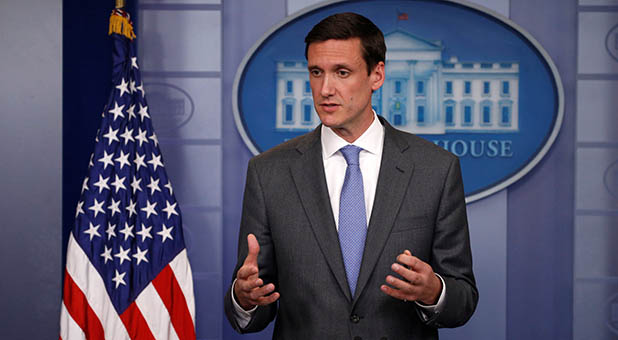Tom Bossert: There’s No Cybersecurity ‘Partnership’ Between the U.S. and Russia
Contrary to the liberal mainstream media’s reporting—which is likely meant to further its long-since deceased “Russia Narrative”—White House Homeland Security Adviser Tom Bossert, who also serves as President Donald Trump’s adviser on cybersecurity, destroyed the notion that the U.S. and Russian governments were engaging in a “partnership” on cybersecurity issues.
The president’s resident expert on cybersecurity didn’t attend the G20 summit in Hamburg, Germany, last week. But, during a press gaggle aboard Air Force One en route to the U.S. from France, he said he felt the president was right to have conversations, “even with countries with whom we have friction or disagreements,” about the American expectations regarding cybersecurity issues. He said he would be coordinating with the Cabinet secretaries as appropriate to set those “rules of the road.”
“I think it’s a pretty important reminder that President Trump started that conversation by pointedly and exactingly telling President Putin that we will not have our elections messed with. That’s unacceptable,” he said. “I’d like those same rules, norms and expectations to be part of our conversation as we discuss any potential future dialogue with the Russians in cybersecurity.”
Bossert was then asked if Russia was sincere in its efforts to work with the U.S. on cybersecurity issues. Again, the reporter used the mainstream media’s phrase “partnership,” which drew the homeland security adviser’s ire.
“I would say we are not discussing a partnership here,” he said. “That is not what President Putin left the room for. That is certainly not what President Trump suggested. And that’s not what I’m suggesting today. A partnership is a much different topic.
“What was broached at that G20 conversation, as I understand it, was an opportunity to continue a dialogue—one that had in the past existed between the two countries, and I think one that we could pursue in the future with the appropriate reservations and the appropriate expectations, that we at least start with what is acceptable behavior in cyberspace and what norms and expectations we’ll have moving forward, long before you get into the enforcement of those rules or anywhere near before we get into a partnership.
“But again, the instinct to make some progress on behalf of the American people and their security online is a good instinct on President Trump’s part.”
The press then tried to reframe their narrative by suggesting the president announced the cooperation “prematurely.” Bossert again smacked that assertion down by suggesting the media was once again twisting the president’s words.
“I think the president was clear in saying that the conversation was raised and the idea was suggested, and that he was open to it,” he said. “And I’m going to help him put the contours on that and give him some advice back on how we can frame that in a productive way without giving up any U.S. security and certainly without giving up any election security, which is President Trump’s priority.”
Why not a partnership? Bossert gave a very pointed answer:
“The distinction I made was that a partnership suggests that you’ve reached a place where you believe that you have a trusted relationship and you’ve come to some common agreement on ideals and goals and behaviors. I don’t believe that the United States and Russia have come to that point yet in cyberspace. And until we do, we wouldn’t have the conversation about partnership. But we had to have a dialogue, and that’s where we’ll start.”
The homeland security adviser also gave a brief readout of the president’s meetings Thursday and Friday with French President Emanuel Macron, during which they discussed the fight against ISIS, the future of Syria after ISIS is routed and how to combat Iran’s destabilizing influence in the Middle East:
“So, among other things in the bilateral conversation yesterday, the presidents discussed Syria—defeating ISIS in general, but Syria specifically; our desire to have a political solution outside and after our military solutions prevail. They discussed counterterrorism in general, as it will be an enduring and ongoing problem after our defeat-ISIS campaign takes the physical caliphate from ISIS.
“They discussed limiting and containing and, ultimately, reducing and removing Iranian sponsorship for terrorism and regional influence. They discussed the current relations with Qatar. They discussed what to do after our short-term objectives are met in reducing their contributions—financial contributions—to terrorism, and three or four other topics.
“In general, the conversation was detailed, the conversation was fairly involved, and we discussed terrorism, largely. President Trump thanked President Macron for France’s continued and pretty extensive support for not only American efforts, but for global efforts to counter terrorism in North Africa and throughout the Sahel region. That’s something that the French have been committed to and have doubled and redoubled their efforts, I think, in the last three to five years. And President Macron has shown leadership there in that regard.” {eoa}
















































